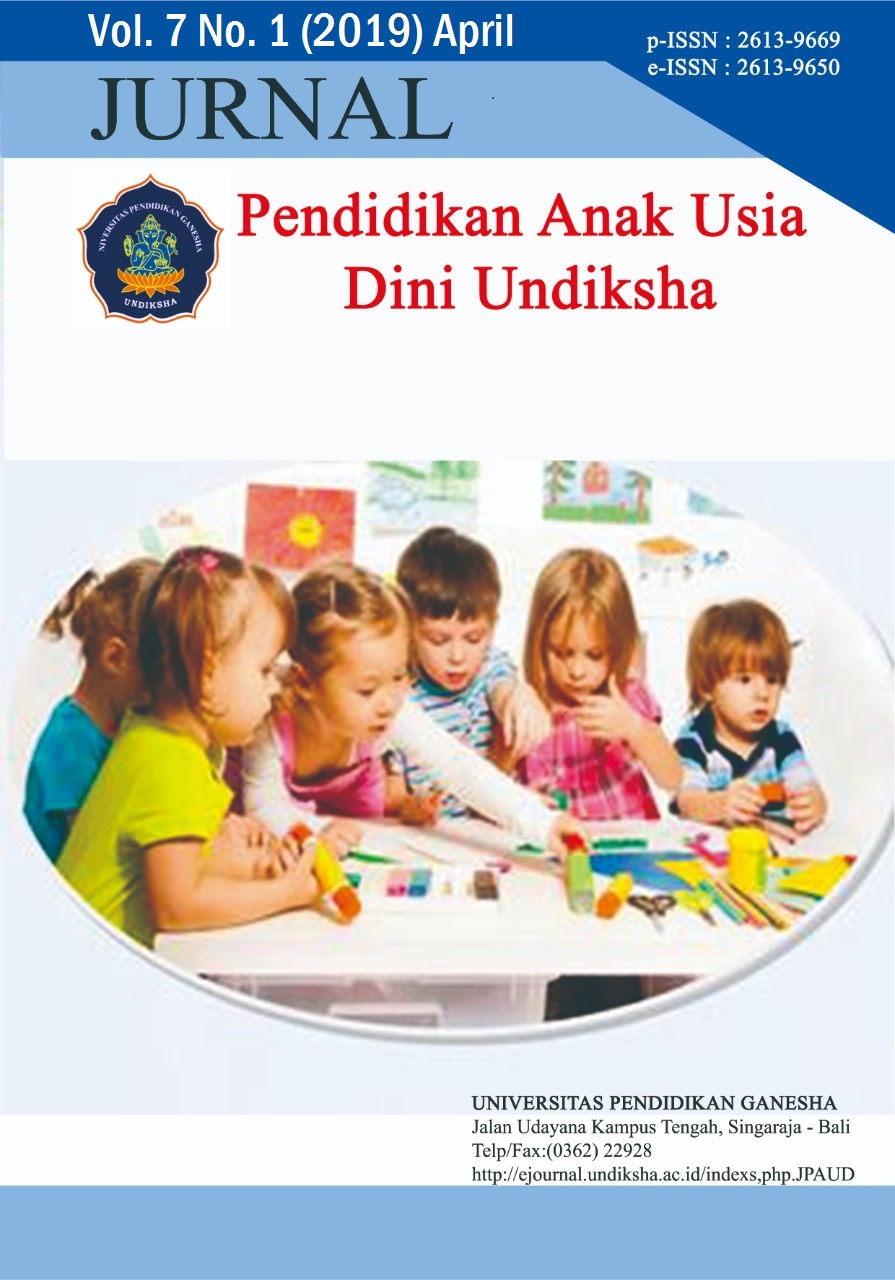PENGARUH METODE PROYEK BERBASIS PENDEKATAN SAINTIFIK TERHADAP KECERDASAN INTERPERSONAL ANAK KELOMPOK B TK GUGUS I SUKAWATI TAHUN AJARAN 2018/2019
DOI:
https://doi.org/10.23887/paud.v7i1.18732Abstract
Penelitian ini bertujuan untuk mengetahui pengaruh metode proyek berbasis pendekatan saintifik terhadap kecerdasan interpersonal anak kelompok B TK Gugus I Sukawati Tahun Ajaran 2018/2019. Penelitian ini merupakan penelitian eksperimen semu (quasi eksperimen) dengan nonequivalent control group design. Populasi dalam penelitian ini adalah seluruh kelompok B TK Gugus I Sukawati yang memiliki jumlah kelas sebanyak 17, dan berjumlah 457 anak. Sampel penelitian ditentukan dengan teknik random sampling, sehingga diperoleh kelompok B2 TK Ana Kumara (28 peserta didik) sebagai kelompok eksperimen dan kelompok B1 TK Kumara Shanti Guwang (27 peserta didik) sebagai kelompok kontrol. Data kecerdasan interpersonal dikumpulkan menggunakan teknik non-tes berupa observasi dengan lembar observasi, kemudian data yang diperoleh dianalisis dengan uji-t. Hasil analisis penelitian ini menunjukkan nilai rata-rata kelompok eksperimen (84,31) lebih tinggi daripada nilai rata-rata kelompok kontrol (71,84). Berdasarkan hasil analisis uji-t dengan dk = 53 dan taraf signifikansi = 5%, diperoleh thitung > ttabel (5,97 > 2,000) maka Ho ditolak, berarti terdapat perbedaan yang signifikan kecerdasan interpersonal anak kelompok eksperimen dengan kelompok kontrol. Dalam penelitian ini peningkatan kecerdasan interpersonal anak diukur pada kemampuan anak dalam bekerjasama, berempati, kepekaan dan pemahaman sosial, serta komunikasi sosial. Berdasarkan hasil tersebut, dapat disimpulkan bahwa metode proyek berbasis pendekatan saintifik berpengaruh terhadap kecerdasan interpersonal anak kelompok B TK Gugus I Sukawati Tahun Ajaran 2018/2019.Kata Kunci : Metode proyek, pendekatan saintifik, kecerdasan interpersonal, anak usia dini
This study aims to determine the effect of the project method based on the scientific approach to interpersonal intelligence in children in group B TK Gugus I Sukawati Academic Year 2018/2019. This research is a quasi-experimental study with nonequivalent control group design. The population in this study were all groups B TK Gugus I Sukawati who had a total class of 17, and numbered 457 children. The research sample was determined by random sampling technique, so that it obtained B2 group Ana Kumara (28 students) as the experimental group and B1 TK Kumara Shanti Guwang group (27 students) as the control group. Interpersonal intelligence data was collected using non-test techniques in the form of observations with observation sheets, then the data obtained were analyzed by t-test. The results of the analysis of this study showed that the average value of the experimental group (84.31) was higher than the average value of the control group (71.84). Based on the results of the t-test analysis with dk = 53 and significance level = 5%, obtained tcount> ttable (5.97> 2,000) then Ho is rejected, meaning there is a significant difference in interpersonal intelligence of the experimental group with the control group. In this study the increase in interpersonal intelligence of children was measured in the ability of children to cooperate, empathize, sensitivity and social understanding, and social communication. Based on these results, it can be concluded that the project method based on the scientific approach influences the interpersonal intelligence of children in group B TK Gugus I Sukawati Academic Year 2018/2019.
keyword : Project method, scientific approach, interpersonal intelligence, early childhood
Downloads
Published
2019-07-20
How to Cite
., P. D. A. S. P., ., L. A. T. S., & ., D. I. N. S. M. (2019). PENGARUH METODE PROYEK BERBASIS PENDEKATAN SAINTIFIK TERHADAP KECERDASAN INTERPERSONAL ANAK KELOMPOK B TK GUGUS I SUKAWATI TAHUN AJARAN 2018/2019. Jurnal Pendidikan Anak Usia Dini Undiksha, 7(1), 13–24. https://doi.org/10.23887/paud.v7i1.18732
Issue
Section
Articles
License
Authors who publish with the Jurnal Pendidikan Anak Usia Dini Undiksha agree to the following terms:
- Authors retain copyright and grant the journal the right of first publication with the work simultaneously licensed under a Creative Commons Attribution License (CC BY-SA 4.0) that allows others to share the work with an acknowledgment of the work's authorship and initial publication in this journal.
- Authors are able to enter into separate, additional contractual arrangements for the non-exclusive distribution of the journal's published version of the work (e.g., post it to an institutional repository or publish it in a book), with an acknowledgment of its initial publication in this journal.
- Authors are permitted and encouraged to post their work online (e.g., in institutional repositories or on their website) prior to and during the submission process, as it can lead to productive exchanges, as well as earlier and greater citation of published work. (See The Effect of Open Access)











